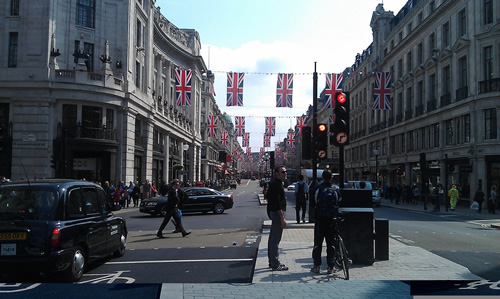Expatriating
to London Q & A
By Jill Gordon

Since my article on London’s Overlooked Neighborhoods ran, I’ve received a deluge of emails from readers seeking advice on living and working in London. Regrettably, the process of expatriating and settling here is full of confusing and sometimes even ridiculous requirements that will acquaint you with Britain’s backward — if still lovable — idiosyncrasies before you ever leave home. Expat hopefuls may feel that the Brits are as keen on keeping foreigners out of their dreary isle as they are on keeping out rabies. Nevertheless, Britain hosts a thriving community of American expatriates.
How can I become eligible to work in the UK?
To legally hold a job you need
a working visa from the British Embassy in the U.S. Unfortunately,
obtaining a work visa is a process that can only be undertaken
by an employer who wants to hire you and can demonstrate why a
particular American candidate fits that job better than any UK
candidate.
To make matters worse, work permits can only
be secured for certain professions (not for clerical jobs,
for example). For specific information on requirements, see a
site dedicated to work
permit procedures and availability for the United Kingdom.
Can’t I just move to the UK and then look for a job?
Technically, it is illegal for Americans to
enter the UK and begin job-hunting and interviewing when they’re
on a tourist visa. In reality, many people do so.
How can I legally find a job in the UK if I cannot job search in the UK?
There is no easy answer to this most popular
of questions. It is possible to search for jobs in the UK over
the Internet. You can find the job listings online on variety of sites.
Just search on "United Kingdom jobs" and you will find
a plethora of job
board sites.
Another option is to contact multinational U.S.-based companies and inquire about jobs in their London offices. My husband, for example, found a job in London after meeting with the New York office of an investment bank and interviewing via teleconference with its London office. (Investment banks and news organizations have traditionally been a major source of jobs for Americans in London.)
Once I’ve found a job, how can I find housing in London?
Regardless of whether you are interested in
renting or buying in the UK, your first step in house hunting
should be to contact an estate agent. With many listings posted which you can sort and filter according to your needs, OnTheMarket is
one of many good places to start your hunt to rent a flat in London.
The cost of housing in London has increased in a major way over the past 20+ years. Rental prices for flats are priced on a weekly rate, and the British calculate 4.3 weeks in a month
Where in London
Should I Live?
London is an endless series of interconnected neighborhoods and villages, each with its own distinct character. So choosing your location is very important.
If it’s imperative that you live in the most central and fashionable districts of London, the neighborhoods of Chelsea, Knights-bridge, Mayfair, Notting Hill, Soho, and South Kensington are some good places to start. If you’re looking for more affordable (and less centrally located) housing but don’t want to sacrifice atmosphere, check out Battersea, Bayswater, Clapham, Fulham, Islington, and Maida Vale.
There are many expat resources online for the London house-hunter, as well as many in-depth blog posts on places to live in London (Editor's note: see expat resources on the UK for many more sources).
In order to succeed in expatriating to the UK, you’ll need lots of patience and even more determination. But for almost every American I know here in London it’s been worth it.
JILL GORDAN, who lives in London, is a regular contributor to Transitions Abroad.
|
